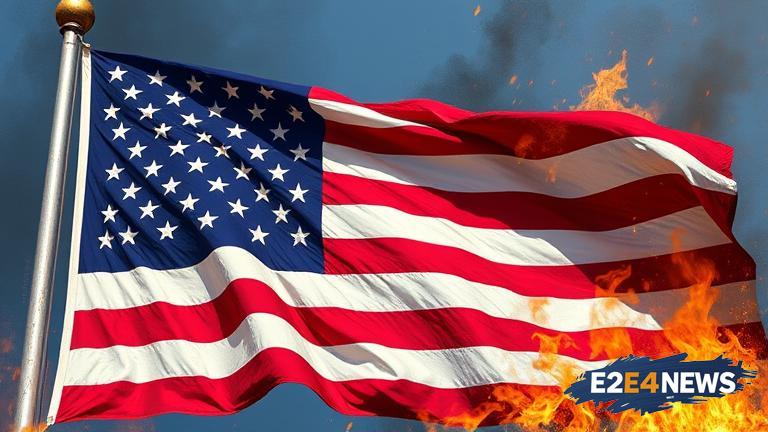In a move that has sparked widespread controversy, President Trump has proposed a ban on burning the American flag, a form of protest that has been protected by the Supreme Court since 1989. The proposal, which was announced on social media, has been met with criticism from civil liberties groups and constitutional scholars, who argue that it undermines the principles of free speech and expression. The Supreme Court’s decision in Texas v. Johnson, which ruled that flag burning is a form of protected speech, has been a cornerstone of American jurisprudence for decades. However, Trump’s proposal seeks to overturn this decision, citing the need to protect the flag and the values it represents. Critics argue that this move is a thinly veiled attempt to suppress dissent and stifle free speech, particularly among marginalized communities. The American Civil Liberties Union (ACLU) has condemned the proposal, stating that it is a clear violation of the First Amendment. The organization’s executive director, Anthony Romero, has argued that the proposal is a ‘dangerous and unconstitutional’ attempt to restrict the rights of Americans to express themselves. Other civil liberties groups, including the National Coalition Against Censorship and the PEN America, have also spoken out against the proposal. The proposal has also been criticized by constitutional scholars, who argue that it is a clear attempt to undermine the authority of the Supreme Court. Professor Laurence Tribe, a renowned constitutional law expert, has stated that the proposal is ‘a blatant attempt to circumvent the Constitution and undermine the rule of law.’ The proposal has also sparked a heated debate about the role of the flag in American society and the limits of free speech. While some argue that the flag is a sacred symbol that deserves to be protected, others argue that it is a powerful symbol of American values, including freedom and dissent. The debate has also raised questions about the impact of the proposal on marginalized communities, who have historically used flag burning as a form of protest against systemic injustice. The proposal has been met with widespread criticism from lawmakers, including Senator Chuck Schumer, who has argued that it is a ‘clear attack on the First Amendment.’ The proposal has also sparked a backlash from veterans’ groups, who argue that it is a ‘disrespectful’ attempt to restrict the rights of Americans to express themselves. As the debate continues to unfold, it remains to be seen whether Trump’s proposal will become law. However, one thing is clear: the proposal has sparked a national conversation about the importance of free speech and the limits of government power. The proposal has also highlighted the ongoing struggle for civil liberties and the need for continued vigilance in the face of government overreach. In conclusion, Trump’s proposal to ban flag burning is a clear threat to free speech and the principles of American democracy. It is a move that has been widely condemned by civil liberties groups, constitutional scholars, and lawmakers, and it remains to be seen whether it will become law. As the nation continues to grapple with the implications of this proposal, it is clear that the debate will have far-reaching consequences for the future of free speech and American society.
